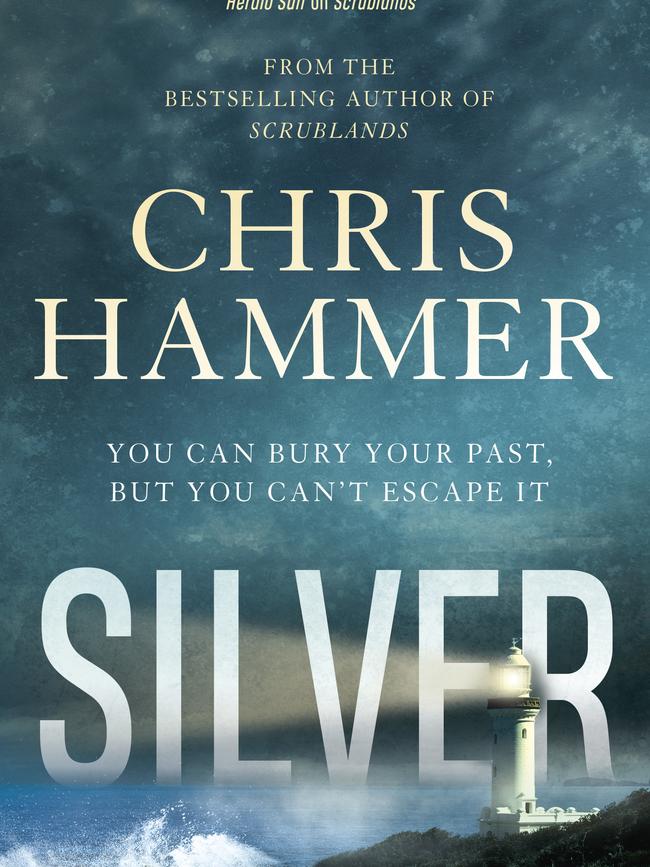Prodigal pursuit of a silver lining
This follow-up novel is as much about the protagonist’s growth as a person in facing his demons as it is about crime in a small town.

Chris Hammer’s exciting first novel, Scrublands, took a moribund Riverina town in a drought-ruined landscape for its setting. This harsh environment seemed to foster the feigning and grotesque, the bush Gothic.
Silver, its sequel, is less about broaching the extraordinary than confirming and expanding on the author’s skills as a creator of distinctive characters and plots. Hammer grounds his people in territory and trends recognisable to many readers in this country and internationally, and well explored in Australian writing.
Port Silver is a fictitious version of the gentrifying mid-sized towns that dot Australia’s eastern seaboard, and Hammer describes its natural and human-made characteristics with the same fidelity and analytical insight he brought to Scrublands.
As he shows, crimes and misdemeanours can organically emerge among the people in such towns, at times among people wanting what they perceive to be assets and prosperity for their community as well as themselves. Silver can be the currency of betrayal.
Journalist turned freelance true-crime writer Martin Scarsden is again Hammer’s protagonist. Martin drives down the escarpment into his hometown after a stubbornly non-communicative absence of 23 years. It was his partner, Mandy, who instigated this move to Port Silver after learning she had inherited a house there.

Mandy foresaw a fresh start for herself and her 10-month-old son. With Martin having been less than frank about his origins it didn’t register with her that she was inviting him to a place he had fled after finishing high school.
Mandy’s uninformed embracing of Martin’s home town presents a hugely improbable coincidence at the novel’s outset, one I found offputting. I wished Hammer had devised another means of installing his protagonist in a coastal town for the duration of some criminal adventure.
However, another thing made clear at the outset is that Silver will not only be about crime. The need for personal growth, which Martin began to acknowledge in Riversend, is now, two months later, an imperative. Readers impatient for crime action should note how Martin rationalises his circumstances: “Maybe his return to Port Silver is fated, giving him a chance to make amends, to reconnect …”
Initially, Hammer plays up his protagonist’s need to address the troubled relationship he endured with his alcoholic father following the sudden deaths of his mother and young sisters. Martin finds himself mentally reliving galling episodes. In the “cauldron of his youth”, Martin lived with his father in the struggle-street part of town known as the Settlement, and later with his more nurturing Uncle Vern.
It’s the scantily educated Vern who’s willing to celebrate “the return of the portable”. “Prodigal”, Martin corrects him, although “portable” is an apt descriptor for a man who’s been an itinerant foreign correspondent. Along the way, Hammer gestures to the dispossession lying behind contemporary indigenous land title claims and successful blended families such as that of Vern and Goori woman Josie.
The killing in the opening chapter of Silver is less appalling and inexplicable than the multiple murders at the start of Scrublands. A real estate agent lies dead in a rental townhouse. Readers familiar with Australian crime writing’s penchant for crooked dealings involving land and property will foresee the kind of plot that’s coming.
For Martin, his discovery of the recently deceased man is especially distressing because Mandy is already at the scene, her hands bloodied, and because he recognises the man as one of his closest friends in childhood.
He begins seeking the killer, his dual motives being to clear Mandy of police suspicion and help the dead man’s mother, another real estate agent.
Martin quickly spots evidence of sharks both actual and metaphorical. Among the port’s business-minded citizens, the chief game is scheming to do with land acquisition and resort development, while the secondary game is collusion with visitors in questionable and illegal practices.
There’s a motley line-up of players, including a swami on a 457 visa, a onetime champion surfer, a lawyer’s punchy son, a Greek-Australian matriarch, and a former Settlement lad going by the “nom de development’’ Tyson St Clair. State politicians are open to trade-offs. Self-declared conservationists may have their price. Among the apparently insouciant backpackers it’s useful to distinguish the grifters from the drifters.
Martin’s headlong investigating pitches him into intoxicating scenarios while impinging on his need to consolidate his relationship with Mandy and develop affection for her child. Fortunately, Mandy owns the supermodel looks and kickass ferocity of a cartoon hero and is capably fending for herself.
She’s impatient and unsentimental when Martin’s frailties surface, preachy when voicing her hopes for her son, and occasionally so overwhelmed by multiple pressures that she cries with an intensity Martin regards as “hysterical”. Forty-one-year-old Martin must surf an emotional learning and adjustment curve if he wants to stick around.
Alternative eye candy and grounds for mutual suspicion are not far away, in the persons of an American traveller who is forever “thrusting out her breasts” and a predatory soapie actor.
Hammer is a journalist by training and his text is studded with droll meta-narrative commentary on media standards and the commodification of wordsmithing. Martin is told any account he writes of Port Silver doings will be a “sordid little book of small-town intrigues”.
Hummingbird Beach has lately endured a flurry of reporters surrounding its neo-hippie commune, “filling the airwaves with sensation and the tabloids with prurience”. And the ludicrous newshound Doug Thunkleton is out at Mackenzie’s Swamp making noise about a cold case, perhaps barking up the wrong tree.
By the 300-page mark Hammer is well placed to wrap up the resort development rivalries and murder mystery. But, with the gusto of a flourishing creative, he can’t resist indulging his protagonist’s “journalistic imperative”. A fresh cluster of crimes attracts national attention. And with drugs and poisons the agents of harm, these crimes are of a different order to their financial predecessors.
Simultaneously the legal, policing and forensic efforts that will see Mandy either charged or exonerated continue.
There’s a great deal to enjoy in this bountiful novel. I recommend Silver as a good investment.
Robyn Walton is a writer and critic.
Silver
By Chris Hammer. Allen & Unwin, 576pp, $32.99


